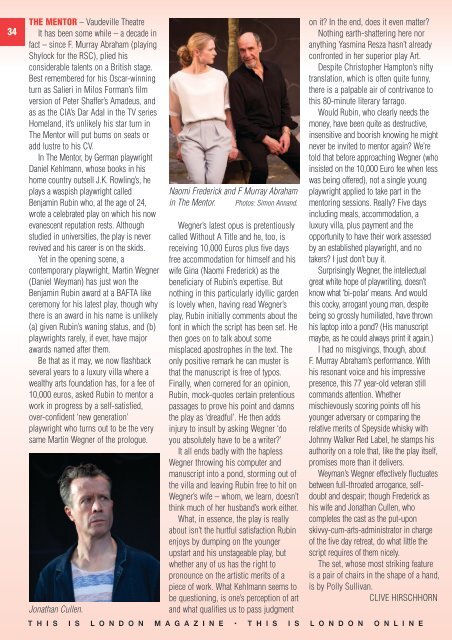TIL_Sommer_21-7-17
Create successful ePaper yourself
Turn your PDF publications into a flip-book with our unique Google optimized e-Paper software.
34<br />
THE MENTOR – Vaudeville Theatre<br />
It has been some while – a decade in<br />
fact – since F. Murray Abraham (playing<br />
Shylock for the RSC), plied his<br />
considerable talents on a British stage.<br />
Best remembered for his Oscar-winning<br />
turn as Salieri in Milos Forman’s film<br />
version of Peter Shaffer’s Amadeus, and<br />
as as the CIA’s Dar Adal in the TV series<br />
Homeland, it’s unlikely his star turn in<br />
The Mentor will put bums on seats or<br />
add lustre to his CV.<br />
In The Mentor, by German playwright<br />
Daniel Kehlmann, whose books in his<br />
home country outsell J.K. Rowling’s, he<br />
plays a waspish playwright called<br />
Benjamin Rubin who, at the age of 24,<br />
wrote a celebrated play on which his now<br />
evanescent reputation rests. Although<br />
studied in universities, the play is never<br />
revived and his career is on the skids.<br />
Yet in the opening scene, a<br />
contemporary playwright, Martin Wegner<br />
(Daniel Weyman) has just won the<br />
Benjamin Rubin award at a BAFTA like<br />
ceremony for his latest play, though why<br />
there is an award in his name is unlikely<br />
(a) given Rubin’s waning status, and (b)<br />
playwrights rarely, if ever, have major<br />
awards named after them.<br />
Be that as it may, we now flashback<br />
several years to a luxury villa where a<br />
wealthy arts foundation has, for a fee of<br />
10,000 euros, asked Rubin to mentor a<br />
work in progress by a self-satisfied,<br />
over-confident ‘new generation’<br />
playwright who turns out to be the very<br />
same Martin Wegner of the prologue.<br />
Jonathan Cullen.<br />
Naomi Frederick and F Murray Abraham<br />
in The Mentor. Photos: Simon Annand.<br />
Wegner’s latest opus is pretentiously<br />
called Without A Title and he, too, is<br />
receiving 10,000 Euros plus five days<br />
free accommodation for himself and his<br />
wife Gina (Naomi Frederick) as the<br />
beneficiary of Rubin’s expertise. But<br />
nothing in this particularly idyllic garden<br />
is lovely when, having read Wegner’s<br />
play, Rubin initially comments about the<br />
font in which the script has been set. He<br />
then goes on to talk about some<br />
misplaced apostrophes in the text. The<br />
only positive remark he can muster is<br />
that the manuscript is free of typos.<br />
Finally, when cornered for an opinion,<br />
Rubin, mock-quotes certain pretentious<br />
passages to prove his point and damns<br />
the play as ‘dreadful’. He then adds<br />
injury to insult by asking Wegner ‘do<br />
you absolutely have to be a writer?’<br />
It all ends badly with the hapless<br />
Wegner throwing his computer and<br />
manuscript into a pond, storming out of<br />
the villa and leaving Rubin free to hit on<br />
Wegner’s wife – whom, we learn, doesn’t<br />
think much of her husband’s work either.<br />
What, in essence, the play is really<br />
about isn’t the hurtful satisfaction Rubin<br />
enjoys by dumping on the younger<br />
upstart and his unstageable play, but<br />
whether any of us has the right to<br />
pronounce on the artistic merits of a<br />
piece of work. What Kehlmann seems to<br />
be questioning, is one’s perception of art<br />
and what qualifies us to pass judgment<br />
on it? In the end, does it even matter?<br />
Nothing earth-shattering here nor<br />
anything Yasmina Resza hasn’t already<br />
confronted in her superior play Art.<br />
Despite Christopher Hampton’s nifty<br />
translation, which is often quite funny,<br />
there is a palpable air of contrivance to<br />
this 80-minute literary farrago.<br />
Would Rubin, who clearly needs the<br />
money, have been quite as destructive,<br />
insensitive and boorish knowing he might<br />
never be invited to mentor again? We’re<br />
told that before approaching Wegner (who<br />
insisted on the 10,000 Euro fee when less<br />
was being offered), not a single young<br />
playwright applied to take part in the<br />
mentoring sessions. Really? Five days<br />
including meals, accommodation, a<br />
luxury villa, plus payment and the<br />
opportunity to have their work assessed<br />
by an established playwright, and no<br />
takers? I just don’t buy it.<br />
Surprisingly Wegner, the intellectual<br />
great white hope of playwriting, doesn’t<br />
know what ‘bi-polar’ means. And would<br />
this cocky, arrogant young man, despite<br />
being so grossly humiliated, have thrown<br />
his laptop into a pond? (His manuscript<br />
maybe, as he could always print it again.)<br />
I had no misgivings, though, about<br />
F. Murray Abraham’s performance. With<br />
his resonant voice and his impressive<br />
presence, this 77 year-old veteran still<br />
commands attention. Whether<br />
mischievously scoring points off his<br />
younger adversary or comparing the<br />
relative merits of Speyside whisky with<br />
Johnny Walker Red Label, he stamps his<br />
authority on a role that, like the play itself,<br />
promises more than it delivers.<br />
Weyman’s Wegner effectively fluctuates<br />
between full-throated arrogance, selfdoubt<br />
and despair; though Frederick as<br />
his wife and Jonathan Cullen, who<br />
completes the cast as the put-upon<br />
skivvy-cum-arts-administrator in charge<br />
of the five day retreat, do what little the<br />
script requires of them nicely.<br />
The set, whose most striking feature<br />
is a pair of chairs in the shape of a hand,<br />
is by Polly Sullivan.<br />
CLIVE HIRSCHHORN<br />
t h i s i s l o n d o n m a g a z i n e • t h i s i s l o n d o n o n l i n e

















